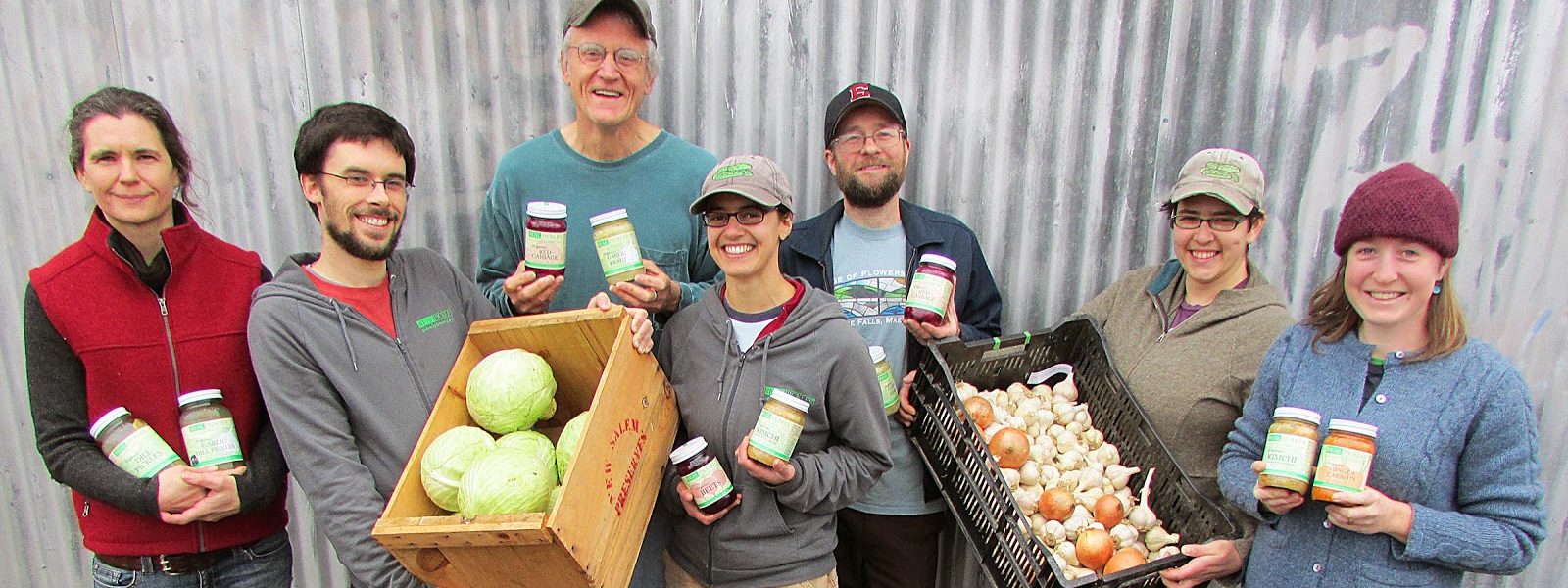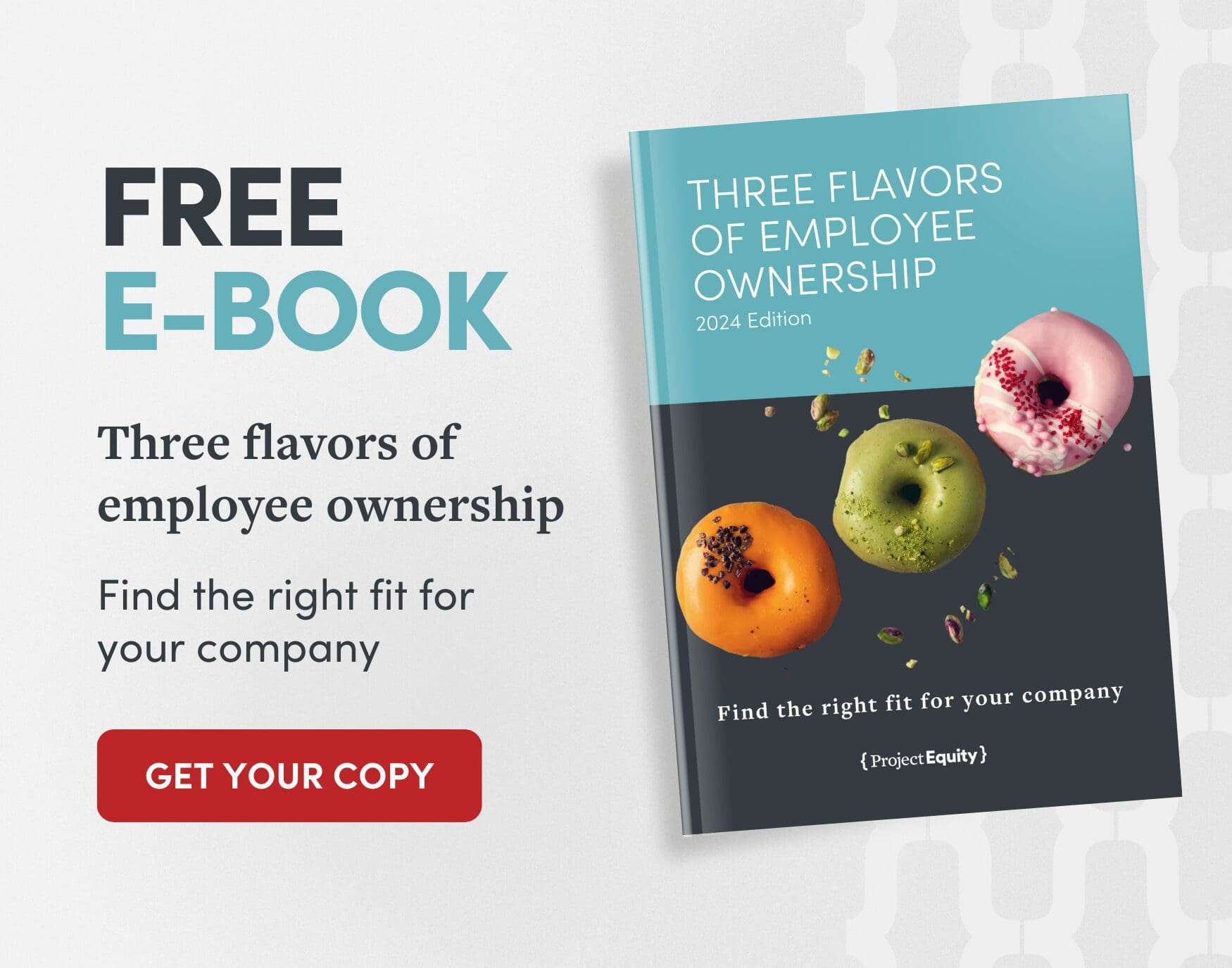Real Pickles
- Massachusetts
Background
Founded by Dan Rosenberg in 2001, Real Pickles is a Greenfield, Massachusetts-based company that makes naturally fermented and raw pickles from regionally grown vegetables. Addie Rose Holland joined Dan Rosenberg as co-owner in 2004, and in 2012, Holland, Rosenberg, and three employees made the decision to convert Real Pickles to a worker-owned cooperative. As of August 2014, Real Pickles had 18 workers, 8 of whom were worker-owners and 10 of whom were non-owner employees.
 Why it became a coop
Why it became a coop
Real Pickles has always been committed to building a sustainable, regional, organic food system by providing nourishing, organic food sourced from local/regional farms. According to Real Pickles’ website, the business decided to transition to a worker-owned cooperative “in order to preserve our social mission for the long-term and to retain our excellent staff.”
A case study of Real Pickles’ transition to worker ownership published by Community Involved in Sustaining Agriculture describes in detail the business’ reasons for favoring the worker cooperative model. Owners and staff of Real Pickles believed that:
[P]rofit-sharing and a role in decision-making would give employees an incentive to stay on for the long term, building a staff of committed, knowledgeable worker-owners. Doing business as a worker-owned cooperative also would help to keep the company’s strong social mission and community roots intact. In addition to sourcing regionally grown and organic ingredients, and limiting sales to the northeastern United States, Real Pickles’ commitments extend to producing food with high integrity, remaining a small business, and providing good jobs and opportunities for its employees. These principles would now be inscribed in the organization’s bylaws and articles of organization, requiring a unanimous vote of the worker-owners to change. Further, the cooperative’s owners would continue to be local residents involved in the company’s day-to-day operations, making it highly unlikely that Real Pickles will ever relocate out of the community.
Conversion logistics
Rosenberg and Holland had been discussing the feasibility of Real Pickles becoming a worker cooperative for several years before the company began its transition into worker ownership. In an interview with Project Equity, Rosenberg noted that given the nature of Real Pickles as a food manufacturing business, during the company’s early days in particular, basic production line work in the kitchen comprised most of the daily tasks. The repetitive, physically demanding labor required in the kitchen meant that, although employees loved working at Real Pickles, the company experienced relatively high turnover. According to Rosenberg, it was only when the business reached a point where enough jobs had been created that went beyond basic production work—jobs that fall more into a “middle layer of management,” and that incorporate more intellectually stimulating tasks—that Real Pickles could realistically consider transitioning to a coop.
Once Real Pickles had grown enough that a ‘critical mass’ of jobs existed beyond the production line, Rosenberg and Holland brought the idea of converting to a worker cooperative to their staff. When they first introduced the idea, Rosenberg and Holland emphasized that, if employees were interested in helping to make the conversion a reality, it was critical that they commit to staying with the business for at least five years.
Real Pickles’ employees welcomed the possibility to transition the business into worker ownership, and a six-month discussion and planning process began. The five workers who became Real Pickles’ founding worker-owners met weekly after work hours, discussing vision, business values, and what the governance and management structures of the cooperative might look like. Rosenberg and Holland intentionally steered away from presenting a specific plan for how the Real Pickles cooperative would take shape; instead, the weekly meetings functioned as a forum for developing a collective vision. The worker-owners agreed that preserving certain aspects of Real Pickles—like the company’s social mission, and keeping the business small—were critically important, and should be written into the company’s foundational governance documents. The weekly meetings allowed the worker-owners to negotiate important components of the company—for example, what it actually meant for the company to remain “small”—and to discuss how these aspects might evolve over time.
Over the six-month preparation period, Rosenberg says that the founding worker-owners
worked hard on a valuation (a purchase price) for the business; we developed and evaluated a five-year sales and marketing plan to determine whether the sales projections on which the valuation would be based were achievable; and we talked about our respective job roles—present and future—so that we could all feel good about making a commitment to stick around Real Pickles for a good while in order to make sure that the transition to coop was successful.
The worker-owners determined the purchase price based on projections about the company’s future earnings, which Rosenberg notes required a commitment to believing that the business could and would grow at the rate needed to pay off the proposed purchase price. Because Rosenberg had done much of Real Pickles’ financial accounting work up until that point, the worker-owners leaned heavily on their CPA to help with this piece of the conversion preparation. Additionally, one of the company’s long-time informal financial advisors gave finance tutorials to help all of Real Pickles’ workers to better understand the financial aspects of the conversion.
In addition to creating a plan for transforming Real Pickles’ business model, the founding worker-owners were faced with the daunting task of raising just over half a million dollars to purchase the company from Rosenberg and Holland and to provide the cooperative with initial operating capital. Though each of the five new worker-owners purchased a $6,000 membership share, they needed to find ways to raise the remaining funds needed to complete the buy-out. To raise this investment, the worker-owners
drew from the experience that one of them had working with Equal Exchange, a successful cooperative with a long history of raising capital by selling non-voting preferred stock. Later, they sought the expertise of the PVGrows collaborative network in western Massachusetts. A financing expert in PVGrows also connected Real Pickles to Cutting Edge Capital, a pioneering consulting firm in the Bay Area that helped them navigate many legal hurdles.
According to Gloria LaBrecque, Northeast Loan and Outreach Officer at the Cooperative Fund of New England the Cooperative Fund of New England’s Cooperative Capital Fund provided its largest unsecured long-term patient capital investment to Real Pickles to help fund the conversion, leveraging funds from other sources to make it work.
The worker-owners decided that the best way to complement the investment from the Cooperative Fund of New England was to sell non-voting preferred stock through a direct public offering. Real Pickles officially launched its own community investment campaign in March 2013. Astonishingly, in just two months, the campaign was over. Seventy-seven investors—a mix of individuals, customers and suppliers, even a number of other co-ops—together invested $500,000, which allowed Real Pickles to fully transition to worker ownership.
After extensive discussions, Real Pickles decided to choose a direct public offering, or DPO, over other financing options, like taking out a loan from a traditional lender or relying on royalty financing, for several reasons. The worker-owners “wanted to be able to control growth carefully and deliberately going forward,” so it was “important that the worker-owners be able to make decisions in line with the business’s social mission, with no pressure from investors to expand just so that they could achieve their high return.” Furthermore, a DPO
would allow for smaller investments to be made by a wider range of community members. This option came with the freedom to advertise and take on an unlimited number of investors. Plus, it provided an excellent marketing opportunity for their business, and would enable Real Pickles to leverage all the community support that they had amassed over the years.
Coop logistics
Since converting to a worker cooperative, Real Pickles has added three new worker-owners (for a total of 8 worker-owners as of January 2015) and has established membership requirements for future worker-owners. The price of one membership share is currently at $6,000, and prospective worker-owners must complete a one-year probationary period before becoming eligible for ownership.
After Real Pickles’ first year as a worker cooperative (as of summer 2014), the company is thriving. According to the company’s 2014 Annual Report, Real Pickles had a “strong first year as a cooperative,” and saw an annual income increase of 18% over the previous year (before the company became a cooperative). The Annual Report describes Real Pickles’ major activities and accomplishments of its first year in the following paragraphs:
We’ve been busy this first year developing our Board of Directors, made up of Real Pickles’ seven worker-owners. The Board has been laying the groundwork for operation as the governing body of a successful and growing enterprise, while maintaining our participatory management structure. We welcomed two new worker-owners and initiated a path to membership for future owners. Regular training and education classes have been established for all staff to develop new skills and understanding related to ownership. And we’ve discussed the opportunities and challenges surrounding ownership, and how we can maintain big-picture thinking while focused on our day-to-day activities (making pickles!). This first year has also seen development of our first Board of Advisors, a group that brings together expertise in cooperative development, natural foods wholesale, food production, finance, food systems thinking, community business, and nutrition. We are grateful for their guidance!
Real Pickles’ Board of Directors meets with the company’s Board of Advisors twice annually to strategically plan for how to grow the business “in a way that is thoughtful and sustainable.” Rosenberg notes that the cooperative’s Board of Advisors has played a critical role in building trust in Real Pickles’ investors from the community that the cooperative could thrive in the long term. The diverse team of experts complements Rosenberg’s and Holland’s hands-on experience running a successful business; few of Real Pickles’ other worker-owners had ownership experience prior to Real Pickles’ conversion, and the Board of Advisors provides an important additional layer of support.
According to Real Pickles’ blog, to ensure that all worker-owners are equipped to continue “practicing the art of ownership,” Real Pickles holds internal classes on five core topics: Social Mission, History of Real Pickles, the Cooperative Movement, Finances, and Governance. All new worker-owners are required to complete the full set of classes before they may be considered for ownership. Because these classes are taught at staff meetings, they are taken by all employees, not just by those workers on track to become worker-owners. According to Rosenberg, these classes are the primary formal tool used by Real Pickles to educate workers about worker ownership; the cooperative maintains a culture of participation and democracy largely through informal means. All employees are encouraged to attend and speak their thoughts at staff meetings, and Rosenberg says that he and Holland constantly encourage workers to think “big picture”—to think as owners. A chart entitled “5-Year Goals for Real Pickles” that hangs on the company’s wall is another illustrative example of Real Pickles’ informal style of maintaining a culture of ownership. Real Pickles’ worker-owners created the chart together in 2014, and it hangs with a marker attached so that individuals may add new ideas as they think of them. Rosenberg notes that the worker-owners often informally discuss how to increase knowledge of and participation in worker ownership, and hope to soon put up additional educational charts about patronage accounts and other components of worker ownership.
Real Pickles reports that it has carefully crafted its bylaws so as to
create clear distinctions between the responsibilities of the worker-owners, the board and staff…taking a cue from fellow worker coop (and fair trade pioneer) Equal Exchange, we later also created a governance matrix that both lays out responsibilities from our bylaws (such as only a consensus of all worker-owners can amend Real Pickles’ mission). Our bylaws also clearly communicate what body is accountable for other areas of the business (for example, the general manager creates the annual budget to be ratified by the board of directors). This clarity of responsibilities has served us well so far; the delineation of authority and oversight has also helped us to work efficiently.
Challenges during conversion
Understanding what options were available for funding the cooperative buy-out initially proved to be a challenge for the future worker-owners of Real Pickles. Although the worker-owners knew they were interested in exploring the idea of selling preferred shares to raise funds for the coop conversion after hearing about Equal Exchange’s use of preferred shares, they had trouble finding a local attorney who could advise them on their legal options. Jeff Rosen of the Solidago Foundation, which funds work less likely to receive support from traditional funding sources, referred the worker-owners of Real Pickles to Cutting Edge Capital, an Oakland, CA-based consulting firm that works to make community investment accessible and affordable to small local businesses. Cutting Edge Capital’s CEO, Jenny Kassan, introduced the worker-owners to the concept of a Direct Public Offering as a means for funding the buy-out (see “Conversion Logistics” section of this case study).
Real Pickles also reached out to the Finance Working Group of the Pioneer Valley Grows (PVGrows) network, which provides financing and technical assistance to area food businesses. PVGrows helped the company arrive at its decision to sell shares of preferred, non-voting stock for $25 each, with a minimum purchase of 100 shares per investor. According to founder Dan Rosenberg, “Looking back, the $2,500 minimum investment was a key decision,” says Rosenberg. “It was a figure low enough to allow for relatively broad participation, while high enough to keep our investment pool a manageable size.”
Now that Real Pickles has completed its first year as an official worker cooperative, Rosenberg says that maintaining diversity amongst the pool of worker-owners has also emerged as a challenge. The cooperative wants to bring as many staff as possible on board as full members (as worker-owners), but has discovered that some staff are hesitant about worker ownership. Managers are much more likely than non-managers to be interested in ownership; Rosenberg says that in large part, this is because it can be difficult to envision making a career of the physically demanding nature of the non-managerial production line positions at Real Pickles. Although all of the cooperative’s five founding worker-owners were managers, Real Pickles has since successfully added three non-manager employees to its pool of worker-owners. Real Pickles hopes to continue increasing worker ownership through maintaining its culture of participation and through increasing efforts to educate staff about worker ownership.
Key lessons / effective practices
The Real Pickles conversion was made fiscally possible by the cooperative’s use of the DPO, an innovative community financing tool. According to Dan Rosenberg, Real Pickles’ direct public offering was so successful because of its strong ties to the community: “Over the last twelve years in business, Real Pickles developed a strong community network, and the backing of this network was absolutely vital to our success.” The case study of Real Pickles’ conversion compiled by CISA continues on:
At the time of the DPO, owners Holland and Rosenberg were already very well connected in their community, as one might expect from an established company that has been selling its products for over a decade, helping to educate folks about the wonders of lacto-fermented pickles. Because of the extensive marketing and personal connection required in a community investment campaign, the credibility and reputation of the business seeking capital are likely to be major determinants of a DPO’s success or failure.
This last statement points to the important boost that business maturity and long-term business success can bring to the cooperative conversion process. Though conversions can also serve to save a struggling business most conversions have a much higher chance of success if the business being converted is already successful and has built an established customer base at the time of conversion.
Another key lesson to be learned from Real Pickles’ example is the importance of maintaining a strong network of external support throughout the conversion process. The diverse group of advisors assembled by Real Pickles to guide it through its transition provided invaluable financial advice, legal advice, and general cooperative mentorship to Real Pickles. In addition to the advisors mentioned by name above, Real Pickles benefitted from the guidance of a number of essential informal advisors, some of who now sit on the cooperative’s Advisory Board. The strong support the business garnered in the surrounding community complemented the solid foundation of knowledge and guidance provided by Real Pickles’ expert advisors, enabling the company to implement the conversion strategies it created by raising the capital necessary to complete the buy-out.
Real Pickles’ tireless efforts to seek out and partner with a diverse group of advisors played a critical role in making the company’s transition to worker ownership a reality, but also highlights how challenging it can be for a converting business to find expert advisors. The U.S. Federation of Worker Cooperatives provides an excellent resource on its website called the “Service Provider Directory” that can help pair businesses interested in converting to worker ownership with advisor and partner organizations, and provides a solution to the barrier encountered by Real Pickles and by many other businesses interested in making the transition to a cooperative.
This case study is based on Project Equity’s interview with Dan Rosenberg, founder and current worker-owner of Real Pickles, in the summer of 2014. In addition to the information provided by Dan Rosenberg, the passages above draw from a detailed case study of the Real Pickles cooperative conversion compiled by Community Involved in Sustaining Agriculture (CISA) in 2013.
Product photo credit: Valley Lightworks Photography (Matthew Cavanaugh and JP Langlands)
Ownership story details
Transitioned
2014
Employees
10
Industry
Type of EO
Topic
Not applicable


